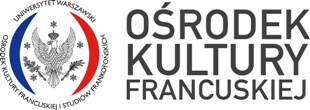Czwartek z socjologią historyczną 15/12/2022 – Ivan Nikolovski & Naum Trajanovski

Ośrodek Kultury Francuskiej i Studiów Frankofońskich UW, Wydział Socjologii UW oraz Sekcja Socjologii Historycznej Polskiego Towarzystwa Socjologicznego zapraszają na spotkanie z cyklu
CZWARTKI Z SOCJOLOGIĄ HISTORYCZNĄ
Czwartek 15 grudnia 2022 r., godz. 17.00
Securitization from below: the non-state mnemonic actors in Bulgaria – North Macedonia historical dispute
Ivan Nikolovski (CEU Vienna)
Naum Trajanovski (IS UW)
Komentarz:
Tchavdar Marinov (Bulg. Acad. of Sciences)
Petar Todorov (Inst. of Nat. History, Skopje)
Spotkanie w języku angielskim.
Spotkanie odbędzie się w formie hybrydowej: w sali (Biblioteka OKFiSF UW, s. 3.012, ul. Dobra 55) i przez Zoom – zainteresowanych prosimy o kontakt mailowy z Nicolasem Maslowskim (n.maslowski@uw.edu.pl) lub sekretariatem OKFiSF UW (okf@uw.edu.pl).
Informujemy, że spotkanie jest rejestrowane. Nagranie będzie wykorzystane w celach naukowych. Udział w spotkaniu jest równoznaczny z wyrażeniem zgody.
Więcej informacji: https://www.facebook.com/groups/606811919731350/
SECURITIZATION FROM BELOW. THE NON-STATE MNEMONIC ACTORS IN BULGARIA – NORTH MACEDONIA HISTORICAL DISPUTE
The literature on mnemonic (and ontological) security in international relations has been rather state-centric, looking at security-seeking practices as prerogatives of the state. However, little has been said about the agency of non-state actors in matters of ontological (in)security between states. We argue that non-state mnemonic actors, such as historians, public intellectuals, and politicians can influence inter-state relations in ontological security terms. Even when states agree to desecuritize contentious historical narratives in pursuit of reconciliation, non-state actors can remain trapped in mnemonic security dilemmas. Acting as mnemonic warriors, they (re)securitize the historical narratives that they believe need to be defended at any cost. Confronted with opposition, states not only revert their policies of desecuritization, but securitize the mnemonic accounts by legal and political means, only to return to the spiral of mutually reinforcing ontological insecurities. We illustrate our points by closely analyzing the historical and identity-related dispute between Bulgaria and North Macedonia, starting from 2017 when the two countries signed the Treaty on good neighborly relations and cooperation. The discussion will be focused on the context of North Macedonia.
Ivan Nikolovski is a Ph.D. candidate at Central European University’s Doctoral School of Political Science, Public Policy, and International Relations in Vienna. Nikolovski closely analyzes the Europeanization of the contested collective memories and national identities in North Macedonia and Monte-negro. He recently published North Macedonia: A fertile ground for external influences” (together with Zoran Nechev, in The Western Balkans in the World, ed. by Bieber and Tzifakis, 2020).
Naum Trajanovski is an assistant at the Faculty of Sociology, University of Warsaw. His academic interests include memory politics in North Macedonia, nationalism studies and sociological knowledge-transfers in East Central and South East Europe. He is the author of a book (in Macedonian) on the Museum of the Macedonian struggle and the Macedonian memory politics (2020).